Using vitamin C after microneedling is somewhat of a controversial practice that has many professionals divided on its safety.
Some believe that vitamin C should never be used after microneedling as it may cause further irritation and inflammation that can damage the skin.
On the other hand, others argue that using vitamin C helps promote healing and encourages collagen production, leading to healthier and younger-looking skin and maximized microneedling results.
However, the truth is always somewhere in the middle, and this is one of those situations where both parties are right.
With that said, yes, you can use vitamin C after microneedling, as it will help infuse the skin with antioxidant activity, encourage the formation of healthier cells, and promote collagen production, leading to better results from microneedling.
On the other hand, using vitamin C after microneedling can also lead to redness, irritation, and discomfort and potentially prolong the healing process.
Therefore, in this article, I will explain how you can safely use vitamin C after microneedling and discuss the potential risks so that you know what to watch out for when combining these two treatments.
Finally, I will recommend the best vitamin C serums you can use after microneedling to ensure maximum results, minimal side effects, and happy, glowing skin.

What is Vitamin C?
Vitamin C is an antioxidant that protects the cells from damage caused by free radicals, which are unstable molecules that steal their electrons in a process called oxidation and degrade the cells by damaging their proteins, membranes, and DNA.
As one of the most researched antioxidants in the market, vitamin C has been observed to brighten the skin, even out the skin tone, reduce the appearance of fine lines and wrinkles, and reverse the damage done by UV rays.
Vitamin C is also a pigment inhibitor that acts as a reducing agent at various oxidative steps of melanin formation, hence inhibiting melanogenesis, which is the process by which the brown pigment melanin is produced by melanocyte cells found in the deepest layer of the epidermis.
This action will not only fade stubborn hyperpigmentation but will also prevent hyperpigmented cells from forming in the deeper layers of the skin.
Lastly, vitamin C also has some anti-inflammatory properties and can help reduce redness and blemishes in some cases.
So from all this, we can tell that the benefits of using vitamin C in your skincare routine are many, and the most commonly observed ones include plumper and glowier skin, reduced inflammation, evened out uneven skin tone, evened out skin texture, reduced hyperpigmentation, and a more uniform complexion.
What is Microneedling?
Microneedling is an aesthetic treatment that involves the use of a pen-like device that has twelve tiny needles used to create microscopic wounds in the skin through rapid prickling of the surface.
The tiny holes in the skin stimulate a natural wound-healing response that triggers collagen production.
Now, besides everyone knowing collagen as the component that maintains skin’s firmness and youthful appearance, many may not know that this protein plays critical roles in regulating the phases of wound healing both in its natural form and as a soluble component in the wound environment.
Collagen fibers produced by fibroblast cells migrate to the wound site and begin to lay down new tissue, acting as a building block and helping to provide strength and structure to the wound.
As the wound heals, the collagen fibers become more organized and cross-linked, which helps to increase the strength and flexibility of the new tissue.
In addition to its structural role, collagen helps regulate the inflammatory response during wound healing. It can modulate the activity of immune cells, reduce inflammation, and promote tissue remodeling. This process helps to ensure that the wound heals properly and that the new tissue is functional and healthy.
Therefore, by quite literally damaging the skin and creating microscopic wounds, microneedling promotes collagen production, which then leads to the reduction of wrinkles, tightening of enlarged pores, smoothing out textural irregularities, and improving the appearance of atrophic acne scars, which are deep, pitted scars caused by severe inflammation.
Can You Use Vitamin C After Microneedling?
While using vitamin C after microneedling has become somewhat controversial, with many professionals disagreeing on whether it’s beneficial or not, the truth is that vitamin C can be used after microneedling.
The reason for this is that vitamin C helps to reduce inflammation and promote collagen production. It also acts as an important antioxidant that can protect the skin from environmental stressors such as sun exposure and pollution, which could lead to further damage to the skin if not adequately treated.
In addition, vitamin C also helps to accelerate wound healing and reduce the formation of scar tissue after the procedure. This is because it boosts collagen production during the proliferation phase of wound healing, allowing for a faster recovery time and less visible scarring.
However, using vitamin C right after microneedling can also come with a few side effects you should be aware of before jumping in with a strong product right after your microneedling procedure.
The Side Effects of Using Vitamin C After Microneedling

The most common side effect of using vitamin C after microneedling is a burning or stinging sensation on the skin, which can be uncomfortable and cause further irritation that could slow down healing.
This can be caused by the strength of the product, as stronger vitamin C serums will cause more irritation than weaker ones, which means you should always opt for a less potent formula or wait at least 24 hours post-microneedling if the vitamin C serum you are using is particularly strong.
Additionally, if your skincare routine consists of more than two or three actives, you should cut it down to one while your skin is healing from the microneedling procedure and focus on using just vitamin C, as using a combination of active ingredients may be too much for the skin to handle and you can end up irritating it further.
Furthermore, if you notice that your skin is becoming overly irritated or sensitive after using vitamin C post-microneedling, discontinue use immediately and give your skin time to heal before reintroducing vitamin C or other more potent actives back into your skincare routine.
Finally, it’s always important to use a good moisturizer that contains healing ingredients such as panthenol, Centella Asiatica, licorice extract, vitamin E, zinc, etc., and finish your morning skincare routine by applying sunscreen, as this will help protect the now sensitive skin from UV and environmental damage and accelerate healing and maximize the results from a microneedling treatment.
The Best Vitamin C Serums to Use After Microneedling
While there are side effects that can arise from using it incorrectly, vitamin C can ultimately be a fantastic post-microneedling treatment that can help maximize the results of the procedure and provide the skin with multiple benefits, including antioxidant protection, collagen production, and accelerated healing.
But besides using it correctly, choosing the right vitamin C serum is also important, as a good quality serum will ultimately keep your skin looking smooth, healthy, and youthful.
Therefore, here are some of the best vitamin C serums to use after microneedling:
TruSkin – Vitamin C Serum (20% Sodium Ascorbyl Phosphate)
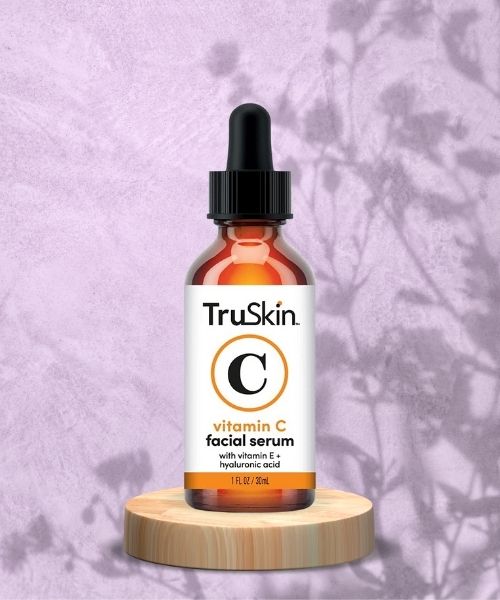
TruSkin’s Vitamin C Serum is a combination of natural ingredients that help soothe, rejuvenate, and brighten the skin with a potent blend of vitamins C, E, hyaluronic acid, and organic aloe vera, all of which can improve the redness and irritation from microneedling and promote healing.
TruSkin’s Vitamin C Serum has also been shown to work effectively in addressing various skin issues, including hyperpigmentation, fine lines, wrinkles, and dullness.
This serum is also non-comedogenic and free from harsh chemicals, parabens, and artificial fragrances, making it perfect for all skin types, including sensitive skin.
Eva Naturals – Vitamin C Plus Skin Clearing Serum (20% Sodium Ascorbyl Phosphate)
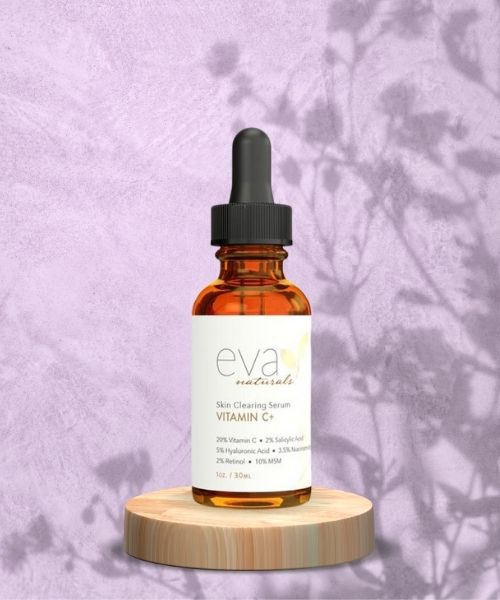
The Eva Naturals Vitamin C Plus Skin Clearing Serum can be a good option for those dealing with dry skin and acne.
Enriched with the softening benefits of squalane and healing rosehip oil, along with soothing Centella Asiatica and hydrating hyaluronic acid, the serum can provide your skin with the moisture and nutrients it needs to heal after intense treatments such as microneedling.
Furthermore, the serum also has a lightweight formula that sinks into the skin and leaves a beautiful, glowy complexion behind.
Vivant Skincare – Pure C + E (15% L-Ascorbic Acid)
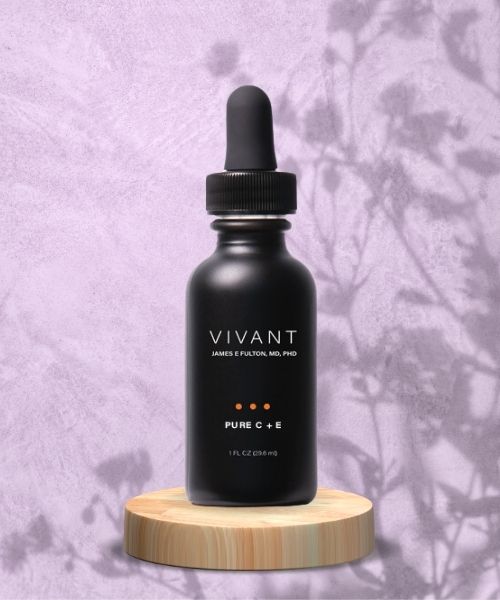
Vivant’s Pure C + E serum is a high-performance product that’s ideal for use after microneedling due to its ability to promote collagen production and enhance the effect of the treatment.
The lightweight serum is packed with a potent combination of Vitamin C and E, which work together to brighten the skin and provide healing benefits and antioxidant protection against environmental damage.
However, what sets Vivant Skincare’s Pure C + E serum apart is its unique, time-release delivery system, which ensures that the active ingredients are slowly released into the skin over time. This means you’ll experience long-lasting effects and benefits that continue improving over time.
The serum is also fortified with other beneficial ingredients, including niacinamide and urea, which further enhance the serum’s antioxidant and skin-refining properties.
Eminence Organic Skin Care – Rosehip Triple C+E Firming Oil (10% L-Ascorbic Acid)
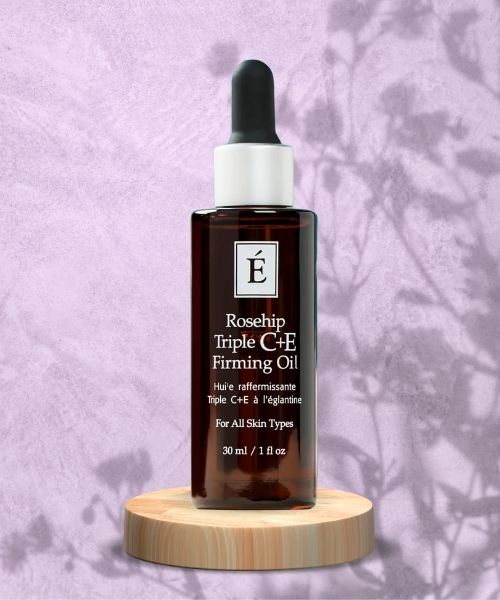
The Eminence Rosehip Triple C+E Firming Oil is another fantastic post-microneedling option for anyone with dry skin that needs extra nourishment.
The rich and luxurious oil is formulated with a blend of natural ingredients, including rosehip, jojoba, and seabuckthorn oils, to soften the skin, reduce inflammation and encourage healing.
Additionally, vitamins C and E work together to brighten and firm the skin while also providing antioxidant protection from environmental stressors along with linoleic acid, which promotes cell regeneration.
iS Clinical – Pro-Heal Serum Advance Plus (15% L-Ascorbic Acid)
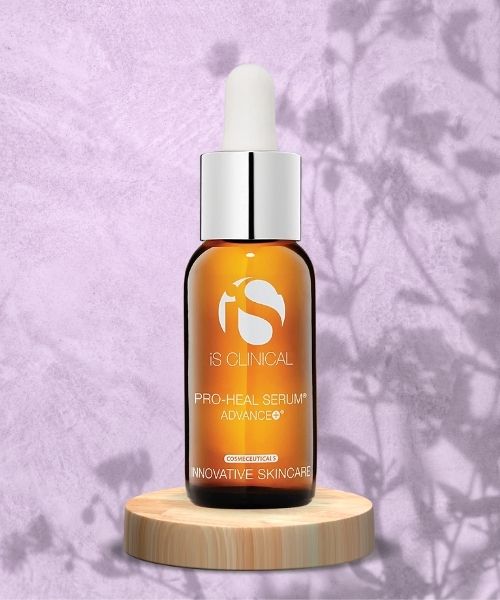
The iS CLINICAL Pro-Heal Serum Advance Plus is a highly effective serum perfect for use after microneedling due to its ability to soothe irritated skin, provide antioxidant protection, and promote healing.
Formulated with vitamins C, E, and A, the Pro-Heal Serum Advance Plus encourages the skin cells to renew themselves quickly and more efficiently, as well as stabilizes the shedding process, which leads to a smoother, brighter complexion.
The advanced formula also contains olive leaf extract, which has anti-inflammatory and antibacterial properties that help calm the skin and prevent infections after microneedling.
In addition to its soothing and healing properties, the serum also has anti-aging benefits and promotes collagen production, which can improve the appearance of fine lines and wrinkles over time, maximizing the effects of microneedling and improving the skin’s overall health and appearance.

My name is Simone and I am a certified skin specialist. I created this website to teach my readers how to take great care of their skin and I also like to occasionally share my honest opinions on skincare products I’ve tried. You can learn more about me here.
